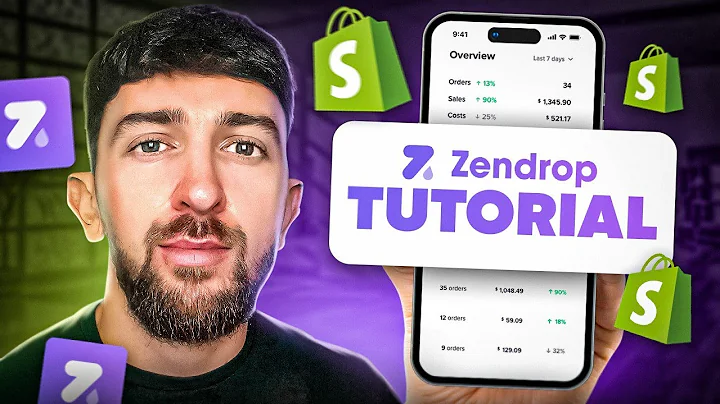Essential Tips for Starting an Online Boutique
Table of Contents
- Introduction
- Understanding LLC (Limited Liability Company)
- Importance of a Seller's Permit
- Setting up a Business Account
- Obtaining a Business License
- Handling Taxes for Your Online Boutique
- The Importance of an EIN Number
- Claiming Business Expenses
- Recording the Process of Starting an Online Boutique
- Another Drop Shipping Vendor: Mochi
Article
Introduction
Starting your own online boutique can be an exciting endeavor. However, before diving into the world of e-commerce, there are some legal aspects that you need to be aware of. In this article, we will explore some key considerations and steps to take before launching your online boutique.
Understanding LLC (Limited Liability Company)
One of the first things to consider when starting a business, including an online boutique, is the type of business structure you want to adopt. One common option is a Limited Liability Company or LLC. An LLC is a business structure in the United States that provides owners with limited personal liability for the company's debts and liabilities. It combines the characteristics of a corporation with those of a partnership or proprietorship.
Pros:
- Provides liability protection for owners
- Offers flexibility in terms of management and taxation
Cons:
- Requires filing paperwork and paying fees to establish an LLC
Importance of a Seller's Permit
Another crucial aspect to consider is obtaining a seller's permit. A seller's permit is a permit issued by your state that allows you to sell products or services and collect and remit sales taxes. Having a seller's permit is necessary to ensure that you operate your boutique legally and comply with tax regulations.
Pros:
- Allows you to sell products or services legally
- Ensures compliance with tax regulations
Cons:
- Requires applying for the permit and understanding tax obligations
Setting up a Business Account
When starting your online boutique, it is essential to have a separate business account. A business account is a bank account specifically used for business transactions. Having a separate account allows you to track your business expenses more effectively and ensures that your personal and business finances remain separate.
Pros:
- Enables proper tracking of business expenses
- Facilitates financial organization and reporting
Cons:
- May involve fees associated with opening and maintaining a business account
Obtaining a Business License
Depending on your location, you may also need to obtain a business license. A business license grants you the right to start and operate a specific type of business in the city, county, state, or country that issues it. It serves as a permit indicating that your business has the government's approval to operate.
Pros:
- Ensures compliance with local regulations
- Provides legal authorization to operate your business
Cons:
- May require additional fees and paperwork
Handling Taxes for Your Online Boutique
As a business owner, it is crucial to understand and fulfill your tax obligations. If your online boutique generates income over a certain threshold (usually $400), you will likely need to pay taxes. It is advisable to consult with a tax advisor or accountant to ensure that you are correctly reporting and paying your taxes.
Pros:
- Peace of mind knowing that you are fulfilling your tax obligations
- Avoids potential penalties or legal issues related to taxation
Cons:
- May require additional expenses for professional tax services
The Importance of an EIN Number
An Employer Identification Number (EIN) is a unique identifier assigned by the Internal Revenue Service (IRS) to businesses. It serves as a business's social security number and allows the IRS to track your business for tax purposes. Obtaining an EIN number is essential when starting your online boutique.
Pros:
- Provides a unique identifier for your business
- Simplifies tax filing and record-keeping
Cons:
- Requires applying for an EIN number with the IRS
Claiming Business Expenses
As a business owner, you can claim certain expenses related to your boutique when filing your taxes. This includes items such as cameras, setup equipment, packaging materials, and marketing expenses. Keeping track of all your expenses can help reduce your tax liability and improve your overall financial management.
Pros:
- Reduces taxable income and potential tax liability
- Reflects the true cost of operating your business
Cons:
- Requires proper documentation and record-keeping of expenses
Recording the Process of Starting an Online Boutique
If you are starting your online boutique from scratch, consider documenting the entire process from start to finish. This can include aspects such as inventory management, pricing strategies, tax obligations, and marketing efforts. Keeping a detailed record will not only help you stay organized but also provide valuable insights for future reference and improvement.
Pros:
- Helps identify areas of improvement and success
- Serves as a reference for future ventures or expansions
Cons:
- Requires time and effort to maintain detailed records
Another Drop Shipping Vendor: Mochi
In the world of drop shipping, finding reliable vendors is essential. One such vendor that you may consider is Mochi. While it is important to conduct your research and due diligence, Mochi is a drop shipping vendor that syncs with Shopify and may be worth exploring for your online boutique.
Pros:
- Offers an alternative drop shipping vendor option
- Integration with Shopify streamlines the process
Cons:
- Requires further research to determine suitability for your business
Conclusion
Starting an online boutique requires careful consideration of various legal aspects. From understanding business structures like LLCs to obtaining necessary permits and licenses, each step plays a crucial role in ensuring your boutique's success. By following the guidelines in this article and conducting thorough research, you can set a strong foundation for your online boutique and embark on a fulfilling entrepreneurial journey.
Highlights
- Understanding the importance of LLC and limited liability for online boutiques
- Obtaining a seller's permit to comply with tax regulations
- Setting up a separate business account for financial organization
- The process of obtaining a business license to operate legally
- Handling taxes and the significance of an EIN number
- Claiming business expenses to reduce tax liability
- The value of documenting the process of starting an online boutique
- Exploring Mochi as an alternative drop shipping vendor
FAQ
Q: What is the benefit of setting up an LLC for my online boutique?
A: Setting up an LLC provides personal liability protection for business owners and offers flexibility in terms of management and taxation.
Q: Why do I need a seller's permit for my online boutique?
A: A seller's permit allows you to sell products or services legally and ensures compliance with tax regulations.
Q: Why is it important to have a separate business account for my online boutique?
A: Having a separate business account allows for proper tracking of business expenses and keeps personal and business finances separate.
Q: What is the purpose of obtaining a business license for my online boutique?
A: Obtaining a business license grants you the right to start and operate a specific type of business and indicates that your business has government approval.
Q: Do I need to pay taxes for my online boutique?
A: If your online boutique generates income above a certain threshold, you will likely need to pay taxes. It is advisable to consult with a tax professional for accurate guidance.
Q: What is an EIN number, and why do I need it for my online boutique?
A: An EIN number is a unique identifier for your business assigned by the IRS. It simplifies tax filing and record-keeping and allows the IRS to track your business for tax purposes.
Q: Can I claim business expenses for my online boutique on my taxes?
A: Yes, business owners can claim certain expenses related to their boutique, such as equipment, packaging materials, and marketing expenses, to reduce their tax liability.
Q: Should I document the process of starting my online boutique?
A: Documenting the process can provide valuable insights for future reference and improvement, helping identify areas of success and opportunities for growth.
Q: Are there any alternative drop shipping vendors besides the recommended ones?
A: Yes, one such vendor is Mochi, which syncs with Shopify. However, it is important to conduct further research to determine the suitability for your business.















